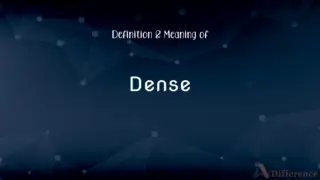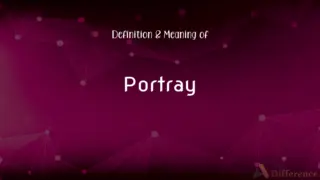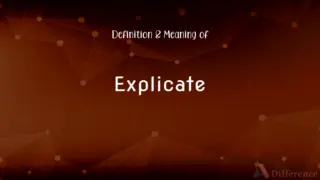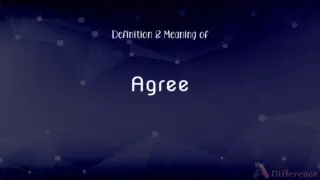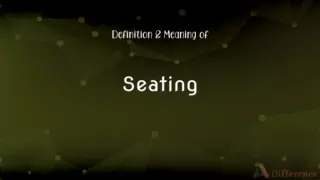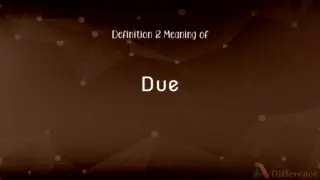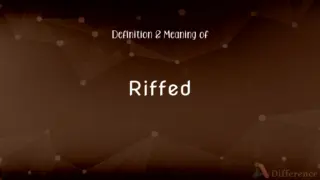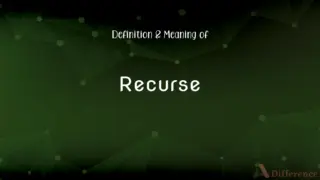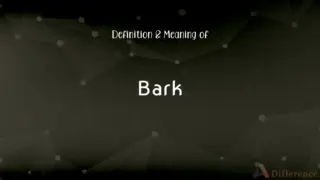Own Definition and Meaning
By Fiza Rafique & Urooj Arif — Updated on March 5, 2024
To own means to possess something as one's personal property. e.g., She was proud to own her first bicycle.
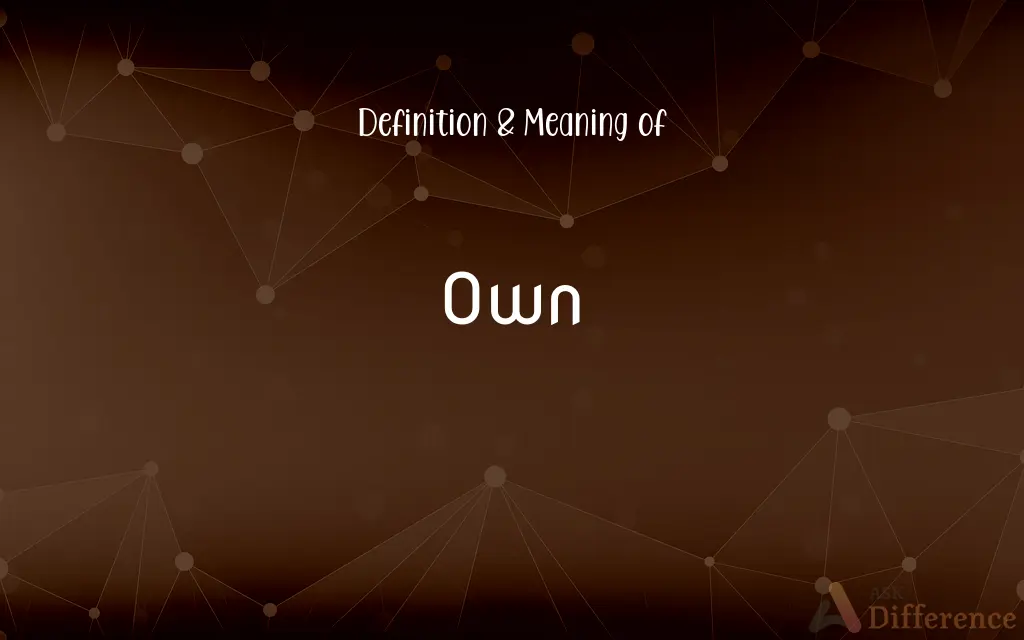
Table of Contents
Own Definitions
Personal Ownership: Having legal rights to a specific property or item.
He finally got to own the car he'd been saving up for.
Self-Identity: Embracing one's traits, beliefs, or qualities as uniquely theirs.
He learned to own his quirks, realizing they made him special.
Animal Ownership: Being the legal keeper or caretaker of an animal.
They own two dogs, three cats, and a parrot.
Exclusive Possession: Holding something that is not shared with others.
They own a private beach accessible only to them.
Intellectual Property: Having legal rights over creations of the mind, like inventions or artworks.
The artist was thrilled to own the copyright to her new song.
Emotional Ownership: Feeling a deep, personal connection to something or someone.
He came to own his role in the play, embodying the character completely.
Property Rights: Having legal title to land or real estate.
After years of saving, they got to own their dream house.
Autonomy: Having control over one's actions or decisions.
She values the freedom to own her choices, good or bad.
Of or belonging to oneself or itself
She makes her own clothes.
That which belongs to one
I wanted a room of my own.
To have or possess as property
Owns a chain of restaurants.
To have control over
For a time, enemy planes owned the skies.
To admit as being in accordance with fact, truth, or a claim; acknowledge
"I own that I have been sly, thievish, mean, a prevaricator, greedy, derelict, / and I own that I remain so yet" (Walt Whitman).
To make a full confession or acknowledgment
When confronted with the evidence the thief owned up to the crime.
Belonging to; possessed; acquired; proper to; property of; titled to; held in one's name; under/using the name of. Often marks a possessive determiner as reflexive, referring back to the subject of the clause or sentence.
Not shared.
When we move into the new house, the kids will each have their own bedroom.
(obsolete) Peculiar, domestic.
(obsolete) Not foreign.
(transitive) To have rightful possession of (property, goods or capital); to have legal title to; to acquire a property or asset.
I own this car.
(transitive) To have recognized political sovereignty over a place, territory, as distinct from the ordinary connotation of property ownership.
The United States owns Point Roberts by the terms of the Treaty of Oregon.
(transitive) To defeat or embarrass; to overwhelm.
I will own my enemies.
If he wins, he will own you.
(transitive) To virtually or figuratively enslave.
To defeat, dominate, or be above, also spelled pwn.
To illicitly obtain superuser or root access to a computer system, thereby having access to all of the user files on that system; pwn.
To be very good.
(intransitive) To admit, concede, grant, allow, acknowledge, confess; not to deny.
(transitive) To admit; concede; acknowledge.
(transitive) To proudly acknowledge; to not be ashamed or embarrassed of.
(transitive) To take responsibility for.
(transitive) To recognise; acknowledge.
To own one as a son
(transitive) To claim as one's own.
To confess.
To grant; to acknowledge; to admit to be true; to confess; to recognize in a particular character; as, we own that we have forfeited your love.
The wakeful bloodhound rose, and shook his hide;But his sagacious eye an inmate owns.
To hold as property; to have a legal or rightful title to; to be the proprietor or possessor of; to possess; as, to own a house.
Belonging to; belonging exclusively or especially to; peculiar; - most frequently following a possessive pronoun, as my, our, thy, your, his, her, its, their, in order to emphasize or intensify the idea of property, peculiar interest, or exclusive ownership; as, my own father; my own composition; my own idea; at my own price.
Have ownership or possession of;
He owns three houses in Florida
How many cars does she have?
Belonging to or on behalf of a specified person (especially yourself); preceded by a possessive;
For your own use
Do your own thing
She makes her own clothes
`ain' is Scottish
Self-Acknowledgment: Accepting responsibility or credit for one's actions or creations.
She was quick to own her mistakes and learn from them.
Financial Ownership: Possessing shares or stakes in a company or investment.
She was excited to own a piece of the tech startup.
Own Snonyms
Possess
To have as belonging to one; have as property.
She possesses a rare collection of stamps.
Have
To possess, own, or hold.
They have a house in the countryside.
Retain
To continue to have something; keep possession of.
He retained his championship title for three years.
Hold
To have or keep in one's grasp; to have ownership of.
He holds the title to the family estate.
Control
To exercise authoritative or dominating influence over; own or command.
The company controls over 80% of the market.
Occupy
To reside or take possession of a place or property.
The family occupies a large farmhouse.
Keep
To retain possession of.
She keeps her grandmother's ring in a safe.
Dominate
To have control over or superiority over something; to own significantly.
He dominates the land in this region.
Claim
To assert ownership of or right to.
She claimed her luggage at the carousel.
Belong to
To be the property of.
This book belongs to me.
Own Idioms & Phrases
Own up to
To admit or take responsibility for one's actions.
He finally owned up to taking the last piece of cake.
On your own
To be alone or independent, without assistance from others.
Moving to a new city meant she was truly on her own for the first time.
Stand on your own two feet
To be independent and self-sufficient.
After college, he was determined to stand on his own two feet and not rely on his parents.
To each their own
A recognition that people have different preferences or tastes.
I don't care for sushi, but to each their own.
Make something your own
To personalize something or adapt it to suit one's personal style or needs.
She took the basic recipe and made it her own by adding exotic spices.
Hold your own ground
To maintain one's position, especially in an argument or debate.
Despite the opposition's strong arguments, he held his own ground.
Be your own worst enemy
To cause most of your problems or difficulties by your actions.
With his constant procrastination, he's his own worst enemy.
Come into your own
To reach a level of performance or ability where one excels and gains recognition.
After years of hard work, the young artist came into his own with a highly successful gallery showing.
Get your own back
To seek revenge or retaliate.
He plotted to get his own back on the coworker who embarrassed him in the meeting.
Hold your own
To maintain one's position or condition in the face of opposition or difficulty.
Despite the fierce competition, she held her own and won the debate.
Dance to your own tune
To follow one's own instincts or desires, rather than conforming to the expectations of others.
He never cared for corporate life, preferring to dance to his own tune by starting his own business.
In a class of your own
To be unique or better than the competition.
With her innovative designs, she's truly in a class of her own.
Be in a league of your own
To be far superior to others in some way.
As a mathematician, she's in a league of her own.
Own goal
An act that unintentionally harms one's own interest.
By spreading rumors about his teammate, he scored an own goal, damaging the team's morale.
Own the room
To command the attention and respect of everyone present.
As soon as she started speaking, she owned the room.
Mind your own business
A directive to avoid meddling in others' affairs.
When she started asking about his personal finances, he told her to mind her own business.
Live by your own rules
To act according to one's personal principles rather than societal expectations.
She lived by her own rules, choosing a nomadic lifestyle over a traditional career.
Take matters into your own hands
To deal with a problem directly, especially because others are not acting.
When the city didn't fix the potholes, the residents took matters into their own hands.
Own the moment
To fully engage with and make the most of the present situation.
Despite the pressure, he owned the moment during his speech, captivating the audience.
Paddle your own canoe
To act independently and decide one's own path in life.
She's always been one to paddle her own canoe, never following the crowd.
Own Example Sentences
She decided to own her decision to travel solo.
He was proud to own a collection of vintage comic books.
They dream of owning their own home someday.
He finally learned to own up to his actions.
They own a small garden where they grow vegetables.
She owns every book written by her favorite author.
She owns a piece of land in the countryside.
He's learning to own his part in the team's success.
They own a cabin by the lake where they spend summers.
Owning a pet requires responsibility and care.
She owns several patents for her inventions.
He takes pride in owning his own business.
Common Curiosities
How do we divide own into syllables?
Own is a single-syllable word and cannot be divided into smaller syllables.
What is a stressed syllable in own?
Since own is a single-syllable word, the entire word is stressed.
How many syllables are in own?
There is one syllable in own.
Why is it called own?
It is called own because it denotes possession or ownership of something.
What is the verb form of own?
The verb form is "own."
How is own used in a sentence?
She owns a beautiful house.
What is the first form of own?
The first form (base form) is "own."
What is the second form of own?
The second form (past simple) is "owned."
What is the pronunciation of own?
Own is pronounced as /oʊn/.
What is the root word of own?
The root word is "own."
What is another term for own?
Another term for own is "possess."
What is the third form of own?
The third form (past participle) is "owned."
What part of speech is own?
Own is a verb.
What is the opposite of own?
The opposite of own is "disown" or "not have."
Is own a noun or adjective?
Own is primarily a verb, but it can also be used as an adjective (e.g., "my own car").
What is the plural form of own?
Own does not have a plural form as it is a verb.
Is own an adverb?
No, own is not an adverb.
Is own a vowel or consonant?
The first letter of own, "o," is a vowel.
Is own a collective noun?
No, own is not a collective noun.
Is own a countable noun?
Own is not a noun; it is a verb.
Is the word own Gerund?
No, own is not a gerund. The gerund form would be "owning."
Is the word “own” a Direct object or an Indirect object?
Own can be used as a transitive verb, so it can have a direct object (e.g., "She owns a car").
Is own an abstract noun?
No, own is not an abstract noun.
Is the own term a metaphor?
Own is not typically used as a metaphor; it is used to denote possession.
Which determiner is used with own?
Determiners such as "my," "your," "his," "her," "our," "their" can be used with own (e.g., "my own house").
Which article is used with own?
Articles such as "the" or "an" can be used with own when it is used as an adjective (e.g., "the own goal").
Is own a negative or positive word?
Own is a neutral word; it is neither inherently negative nor positive.
Is the word own imperative?
Yes, own can be used in the imperative form (e.g., "Own your mistakes").
Which vowel is used before own?
There is no specific rule for using a vowel before own. It depends on the context of the sentence.
Which preposition is used with own?
Prepositions such as "on," "by," or "in" can be used with own, depending on the context.
Which conjunction is used with own?
Conjunctions such as "and" or "but" can be used with own, depending on the context.
What is the singular form of own?
The singular form is "own."
Share Your Discovery
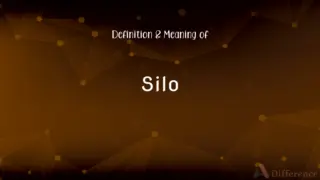
Previous Term
Silo Definition and Meaning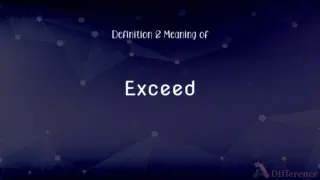
Next Term
Exceed Definition and MeaningAuthor Spotlight
Written by
Fiza RafiqueFiza Rafique is a skilled content writer at AskDifference.com, where she meticulously refines and enhances written pieces. Drawing from her vast editorial expertise, Fiza ensures clarity, accuracy, and precision in every article. Passionate about language, she continually seeks to elevate the quality of content for readers worldwide.
Co-written by
Urooj ArifUrooj is a skilled content writer at Ask Difference, known for her exceptional ability to simplify complex topics into engaging and informative content. With a passion for research and a flair for clear, concise writing, she consistently delivers articles that resonate with our diverse audience.










